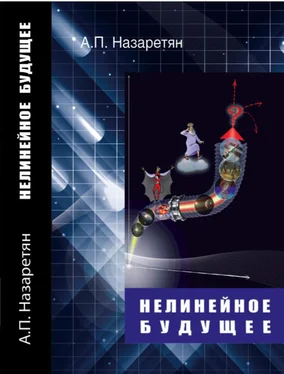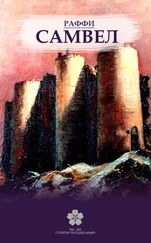Акоп Назаретян - Нелинейное будущее
Здесь есть возможность читать онлайн «Акоп Назаретян - Нелинейное будущее» весь текст электронной книги совершенно бесплатно (целиком полную версию без сокращений). В некоторых случаях можно слушать аудио, скачать через торрент в формате fb2 и присутствует краткое содержание. Жанр: Философия. Описание произведения, (предисловие) а так же отзывы посетителей доступны на портале библиотеки ЛибКат.
- Название:Нелинейное будущее
- Автор:
- Жанр:
- Год:неизвестен
- ISBN:нет данных
- Рейтинг книги:4.33 / 5. Голосов: 3
-
Избранное:Добавить в избранное
- Отзывы:
-
Ваша оценка:
- 80
- 1
- 2
- 3
- 4
- 5
Нелинейное будущее: краткое содержание, описание и аннотация
Предлагаем к чтению аннотацию, описание, краткое содержание или предисловие (зависит от того, что написал сам автор книги «Нелинейное будущее»). Если вы не нашли необходимую информацию о книге — напишите в комментариях, мы постараемся отыскать её.
Нелинейное будущее — читать онлайн бесплатно полную книгу (весь текст) целиком
Ниже представлен текст книги, разбитый по страницам. Система сохранения места последней прочитанной страницы, позволяет с удобством читать онлайн бесплатно книгу «Нелинейное будущее», без необходимости каждый раз заново искать на чём Вы остановились. Поставьте закладку, и сможете в любой момент перейти на страницу, на которой закончили чтение.
Интервал:
Закладка:
Hoek M.Van . New cupule site in the Free State, South Africa // Rock Art Research, 2004, #1: 92-93.
Homo Sungirensis. Верхнепалеолитический человек: экологические и эволюционные аспекты исследования. Т.И Алексеева, Н.О. Бадер (ред.). М.: Научный мир, 2000.
Huges-Warrington M. Big History // Historically Speaking. The Bulletin of the Historical Society 4 (2), 2002: 16-20.
Huntington S. The lonely superpower // Foreign Affairs, 1999, Vol.78, #2: 35-49.
Huntington R., Metcalf P. Celebration of death: The anthropology of mortuary ritual. Cambridge: Cambridge Univ. Press, 1979.
Jantsch E. The self-organizing Universe. Scientific and human implications of the emerging paradigm of evolution. N.Y.: Pergamon Press, 1980.
Jones R. Fire-stick farming // Australian Natural History, 1969, 16(7): 224-228.
Joy B. Why the future doesn’t need us? // Wired, 2000, April: 238-262.
Karlen A . Plague’s progress. A social history of man and disease. N.Y.: Phoenix, 2001.
Kastenbaum R., Aisenberg R. Psychology of death. N.Y.: Springer, 1972.
Kates R.W . Sustaining life on Earth // Scientific American, 1994, Vol.271, #4: 92-99.
Keeley L.H . War before Civilization. The Myth of the Peaceful Savage. N.Y.: Oxford Univ. Press, 1996.
Kellog V. Evolution // Encyclopedia Americana. In XXX Volumes. Vol.X. N.Y., Chicago: Edition A.C., 1944: 605-612.
Kelly G.A. The psychology of personal constructs. N.Y: Norton, 1955.
Kelso J.A.S ., Haken H . New laws to be expected in the organism: synergetic of brain and behaviour // What is Life? The Next Fifty Years. Speculations on the Future of Biology. Cambridge Univ. press, 1997: 137-160.
Kennedy P . The rise and fall of the great powers. London: Unwin Hyman, 1988.
Kindleberger Ch. World economic primacy: 1500 – 1990. Oxford: Oxford Univ. Press, 1996.
Kohlberg L. The psychology of moral development. N.Y.: Harper & Row, 1981.
Kris E., Leites N. Trends in twentieth century propaganda // Psychoanalysis and the Social Sciences. N.Y.: International Univ. Press, 1947: 393-409.
Kumar G . Daraki-Chattan: a Paleolithic cupule site in India // Rock Art Research, 1996, #13: 38-46.
Kurtz D.V. Gender, genes, enculturation: The origin of culture and becoming human // Social Evolution & History, 2009, Vol.8, #2: 51-82.
Kurzweil R . The singularity is near: When humans transcend biology. N.Y.: PG, 2005.
Ladd T. D., Jelezko F., Laflamme R., Nakamura Y., Monroe C., O’Brien J.L. Quantum Computing// Nature, 2010, Vol.464: 45-53.
Le Breton D. Le transhumanism ou le monde sans corps// Relations, 2009, #734: 23-25.
Lebow R.N. Good history needs counterfactuals // Historically Speaking, 2004. Vol. V, #4: 25-28.
Levathes L . When China ruled the seas: The treasure fleet of the Dragon Throne 1405 – 1433. Oxford: Oxford Univ. Press, 1994.
Lewis M.M. How children learn to speak. London: Harrap, 1957.
Liebman C.S. Extremism as a religious norm // Journal for the Scientific Study of Religion, 1983, 2: 75-86.
Lin Yufu J. The Needham puzzle: Why the industrial revolution did not originate in China? // Economic Development and Cultural Change, 1995, Vol.43, #2: 269-292.
Lobsack Th. Versuch und irritum. Der Mensch: Fehlshlag der natur. Munchen: Deut Trans, 1974.
Lowie R . H . Origin of the state. N.Y.: Harcourt Brace, 1927.
Malinowski B. Zycie seksualne dzikich w polnocno-zachodniej Melanezji. Warszawa: Ksiazka i wiedza, 1957.
Marcus S., Catina A. The role of personal constructs in empathetic understanding // Revue Romain des sociales. Serie de psychology, 1976, #2: 173-182.
Markram Н . The blue brain project // Nature Neuroscience Review, 2006, 7(2): 153-160.
Maspero H. Taoism and Chinese Religion. Mass.: University of Massachusetts Press, 1981.
Matsuzawa T. Chimpanzee Ai and her son Ayumu: An episode of education by master-apprenticeship // The Cognitive Animal. Cambridge: The MIT Press, 2002: 189-195.
Mattern S . Rome and the enemy. Imperial strategy in the Principate. Berkeley: Univ. of Caliph. Press, 1999.
McBrearty S., Brooks A.S. The revolution that wasn’t: A new interpretation of the origin of modern human behavior // Journal of Human Behavior, 39 (5), 2000: 453-563.
McEvedy C., Jones R. Atlas of world population history. London: Allen lane, 1978.
McNeill W . H. Control and catastrophe in human affairs // The Global Condition: Conquerors, Catastrophes and Community. Princeton, N.J.: Princeton Univ. Press, 1992: 133-149.
McNeill J.R.M., McNeill W.H. The human web. A bird’s eye view of world history. N.Y. etc.: Norton & Co., 2003.
Melotti U . Competition and cooperation in human evolution // Mankind Quarterly, 25, 1985: 323-351.
Meyer P. Human nature and the function of war in social evolution: A critical review of the naturalistic fallacy // Sociobiology and Conflict. Evolutionary Perspectives on Competition, Cooperation, Violence and Warfare. London: Chapman & Hall, 1990: 227-240.
Milgram S. Obedience to authority: An experimental view. N.Y.: Harper & Row, 1974.
Moravec H. Robot: Mere machine to transcendent mind. Oxford: Oxford Univ. Press, 2000.
Morin E . L.’homme et la mort dans l’histoire. Paris: Le Seuil, 1951.
Munroe, R.L., Hulefeld, R., Rogers, J. M., Tomeo, D. L., Yamazaki, S. K .. Aggression among children in four cultures // Cross-Cultural Research , 2000, 34 (1): 3–25.
Naroll R. A preliminary index of social development // American Anthropologist, 1956, Vol.58: 687-715 .
Nazaretyan A.P. Counterfactuals: A view from Big History // Historically Speaking. The Bulletin of the Historical Society, 2005a, Vol.6, #6: 33-34.
Nazaretyan A.P . Evolution of non-violence: Studies in Big History, self-organization and historical psychology. Saarbrucken: LAP, 2010.
Nazaretyan A.P . Fear of the dead as a factor in social self-organization // Journal for the Theory of Social Behaviour, 2005b. Vol.35, #2: 155-169.
Nazaretyan A.P. Power and wisdom: toward a history of social behavior // Journal for the Theory of Social Behaviour, 2003, Vol.33, #4: 405-425.
Nazaretyan A.P. Virtualization of social violence: A sign of our époque? // Societal and Political Psychology International Review, 2010, Vol.1, #2: 23-36.
Nazaretyan A.P . Western and Russian traditions in Big History: A philosophical insight // Journal for General Philosophy of Science, 2005c, 36: 63-80.
Needham J. Science and civilization in China. Part I. Cambridge: Cambridge Univ. Press, 1954.
Neisser U. Rising score of intelligence tests // American Scientist, 1997, Vol.85: 440-447.
Norenzayan A., Shariff A.F . The origin and evolution of religious prosociality// Science, 2008. Vol.322: 58-62.
O’Brien R. Global financial integration: The end of geography. London: Chatham House Printer, 1992.
Osborn H.F. Evolution and religion in education. N.Y., L: C. Scribner’s Sons, 1929.
Owen-Smith N. Megafaunal extinctions: The conservation message from 11000 Years B.P. // Conservation Biology, 1989, Vol.3, № 4: 405-412.
Читать дальшеИнтервал:
Закладка:
Похожие книги на «Нелинейное будущее»
Представляем Вашему вниманию похожие книги на «Нелинейное будущее» списком для выбора. Мы отобрали схожую по названию и смыслу литературу в надежде предоставить читателям больше вариантов отыскать новые, интересные, ещё непрочитанные произведения.
Обсуждение, отзывы о книге «Нелинейное будущее» и просто собственные мнения читателей. Оставьте ваши комментарии, напишите, что Вы думаете о произведении, его смысле или главных героях. Укажите что конкретно понравилось, а что нет, и почему Вы так считаете.










